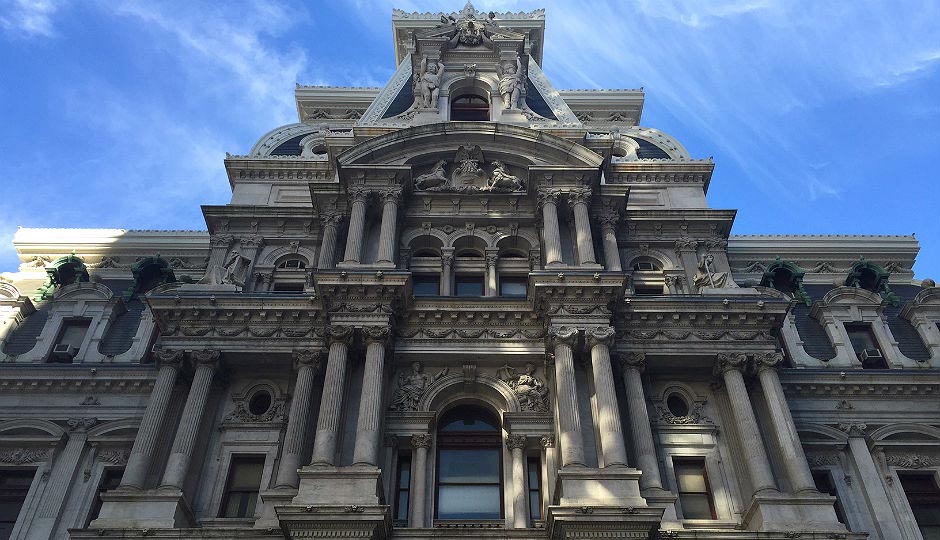OPINION: Mayor’s Commissions Are an Exploitation of Diverse Community Labor

City Hall | Photo by David Gambacorta
There’s no way to put this nicely — the racial diversity of Mayor Jim Kenney’s administration sucks.
For a majority-minority city, somehow the bulk of top leadership positions at City Hall are occupied by whites (as seen in this February 2016 analysis by Philly Mag’s Holly Otterbein) and seem set to remain that way. In June 2016, PolitiFact PA estimated that at least 60 percent of the Kenney administration’s head honchos are white, along with 61 percent of exempt employees making $90,000 or more annually. When it was revealed during last year’s budget hearings that people of color make up only 22 percent of executive staffers in departments overseen by the city’s Chief Administrative Officer (CAO), City Council president Darrell Clarke described the disparity as “clearly problematic.”
“Our city’s workforce should represent the diversity of the city. I think we have improvements that need to be made,” then-CAO Rebecca Rhynhart said during that hearing. “I think we as an administration are taking steps toward that.” (Since then, it seems as though the only steps Rhynhart has taken involved running for her next job.) But there is one place in Kenney’s administration in which racial diversity flourishes: appointments to city commissions and advisory boards that advise the mayor on policy and outreach around communities of color.
Of the more than 60 volunteer city commissions and advisory boards in Philadelphia, a prominent handful — including African American Males, Asian American Affairs, LGBT Affairs, the Cultural Advisory Council, and Construction Industry Diversity — are peopled by dozens of diverse community members lending their services to help improve Philadelphia. Being appointed to a commission in a city whose administration lacks diversity is considered a big deal and publicized with press conferences and photo shoots. In addition to the opportunity to give back, other benefits of taking these positions — increased social capital, image branding, potential professional opportunities — are indisputable.
However, the route to being appointed to a commission — and staying on it — is intense. Commissioners endure a vetting process not far removed from the one city employees go through that requires multiple referrals and interviews, tax and water bill compliance forms, participation in mandatory ethics training, and annual financial disclosures. I’ve spoken to several commissioners who describe the experience as a “college application process” that makes them feel “relieved” once it’s over.
And once appointed, these commissioners undertake some tasks that are perhaps best described not as advisory but as pro bono consulting and strategic development planning. Members of the Commission on LGBT Affairs, for example, will eventually lead sensitivity training for local agencies. Millennial Advisory Committee members are recommending policy and producing reports for the mayor on their demographic. Commissioners from several other bodies are coordinating community outreach programs and seminars throughout the city.
All of this uncompensated labor goes to improving the mayor’s outward-facing advocacy efforts — commissioners are reminded in a guidelines document that “the primary role of advisory boards and commissions is to advise the Mayor on policy dealing with the topic of the board.” However, they are also reminded in these expectations that “most boards do not receive direct funding from the city for their expenditures” but are given the option to fundraise and “open an account in the Mayor’s Fund to hold board funds.”
Translation: Commissioners provide time-intensive unpaid services for the city in an advisory program that is unfunded at the source.
That is exactly how exploitation works — convincing people that there’s value in doing things that completely take advantage of their time, energy, and resources. While it can be argued that good deeds shouldn’t have to be rewarded, there’s a difference between being a volunteer and unwittingly working as an unpaid contractor. Commissioners aren’t simply attending a few meetings in which they get to weigh in on issues — they are developing and implementing policy ideas and projects that many of the mayor’s salaried directors will later take credit for. Sure, some of these commissioners are lawyers, doctors, and high-profile academics who can easily offer their expertise pro bono — but others who work 9-to-5 jobs or run small businesses sometimes face real difficulties when they have to expend their talents so freely. If economic equity and access are considered priorities in the mayor’s attempt to address the city’s growing poverty crisis, the solution should start in his own backyard.
Our city’s most diverse commissioners should not have to produce unpaid labor in order to champion an administration that is having a hard time hiring said minorities to work for them. If the Mayor’s Office is serious about improving representation in their leadership ranks, they need to put in the same level of interest in actually hiring minorities as they do in the meticulous vetting process for diverse commissioners. It’s unsettling that for all of the black willpower that brought Kenney a mayoral victory, it has yet to be seen in his office.


